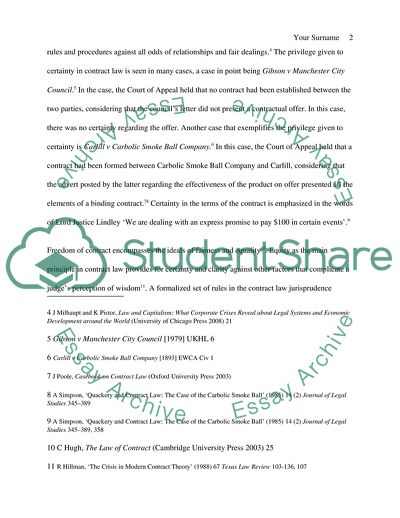Cite this document
(The Law of Contract Essay Example | Topics and Well Written Essays - 2000 words - 1, n.d.)
The Law of Contract Essay Example | Topics and Well Written Essays - 2000 words - 1. https://studentshare.org/law/1787033-the-law-of-contract-demonstrates-that-the-courts-cling-to-an-outdated-vision-of-the-market-which-privileges-certainty-form-and-finality-over-relationships-and-fair-dealing-discuss
The Law of Contract Essay Example | Topics and Well Written Essays - 2000 words - 1. https://studentshare.org/law/1787033-the-law-of-contract-demonstrates-that-the-courts-cling-to-an-outdated-vision-of-the-market-which-privileges-certainty-form-and-finality-over-relationships-and-fair-dealing-discuss
(The Law of Contract Essay Example | Topics and Well Written Essays - 2000 Words - 1)
The Law of Contract Essay Example | Topics and Well Written Essays - 2000 Words - 1. https://studentshare.org/law/1787033-the-law-of-contract-demonstrates-that-the-courts-cling-to-an-outdated-vision-of-the-market-which-privileges-certainty-form-and-finality-over-relationships-and-fair-dealing-discuss.
The Law of Contract Essay Example | Topics and Well Written Essays - 2000 Words - 1. https://studentshare.org/law/1787033-the-law-of-contract-demonstrates-that-the-courts-cling-to-an-outdated-vision-of-the-market-which-privileges-certainty-form-and-finality-over-relationships-and-fair-dealing-discuss.
“The Law of Contract Essay Example | Topics and Well Written Essays - 2000 Words - 1”. https://studentshare.org/law/1787033-the-law-of-contract-demonstrates-that-the-courts-cling-to-an-outdated-vision-of-the-market-which-privileges-certainty-form-and-finality-over-relationships-and-fair-dealing-discuss.


